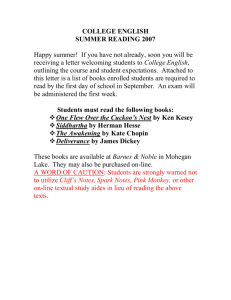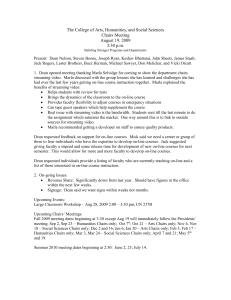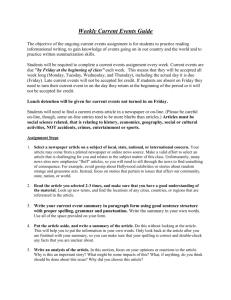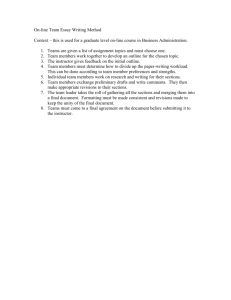Reference to Steering Committee Minutes for February 21, 2009
advertisement
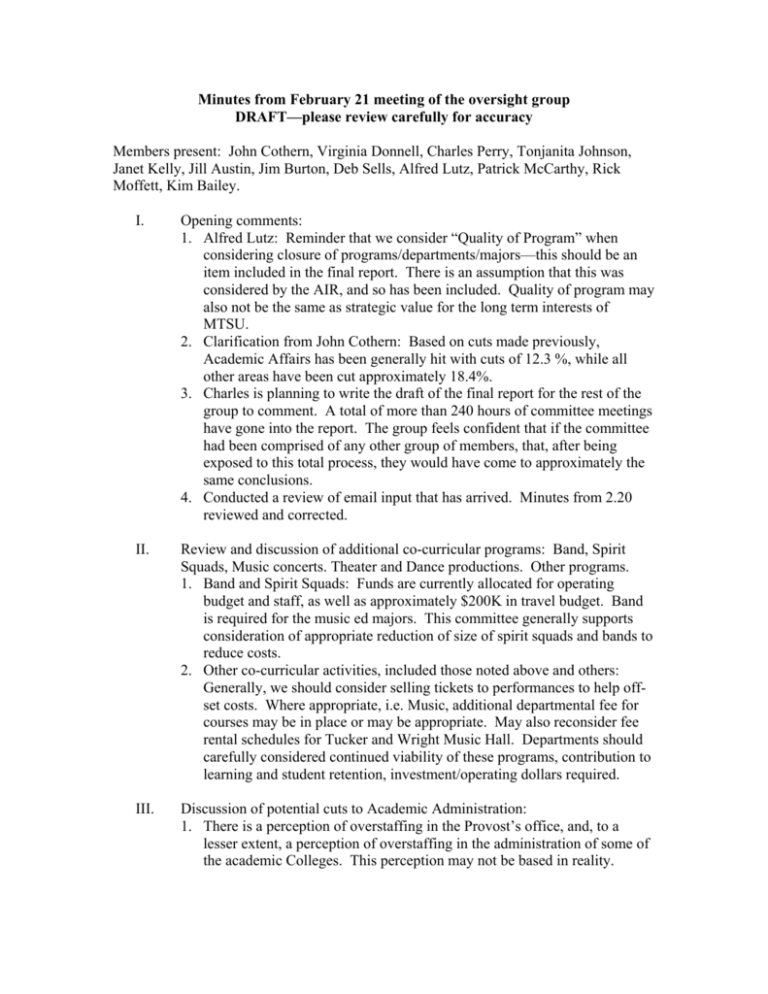
Minutes from February 21 meeting of the oversight group DRAFT—please review carefully for accuracy Members present: John Cothern, Virginia Donnell, Charles Perry, Tonjanita Johnson, Janet Kelly, Jill Austin, Jim Burton, Deb Sells, Alfred Lutz, Patrick McCarthy, Rick Moffett, Kim Bailey. I. Opening comments: 1. Alfred Lutz: Reminder that we consider “Quality of Program” when considering closure of programs/departments/majors—this should be an item included in the final report. There is an assumption that this was considered by the AIR, and so has been included. Quality of program may also not be the same as strategic value for the long term interests of MTSU. 2. Clarification from John Cothern: Based on cuts made previously, Academic Affairs has been generally hit with cuts of 12.3 %, while all other areas have been cut approximately 18.4%. 3. Charles is planning to write the draft of the final report for the rest of the group to comment. A total of more than 240 hours of committee meetings have gone into the report. The group feels confident that if the committee had been comprised of any other group of members, that, after being exposed to this total process, they would have come to approximately the same conclusions. 4. Conducted a review of email input that has arrived. Minutes from 2.20 reviewed and corrected. II. Review and discussion of additional co-curricular programs: Band, Spirit Squads, Music concerts. Theater and Dance productions. Other programs. 1. Band and Spirit Squads: Funds are currently allocated for operating budget and staff, as well as approximately $200K in travel budget. Band is required for the music ed majors. This committee generally supports consideration of appropriate reduction of size of spirit squads and bands to reduce costs. 2. Other co-curricular activities, included those noted above and others: Generally, we should consider selling tickets to performances to help offset costs. Where appropriate, i.e. Music, additional departmental fee for courses may be in place or may be appropriate. May also reconsider fee rental schedules for Tucker and Wright Music Hall. Departments should carefully considered continued viability of these programs, contribution to learning and student retention, investment/operating dollars required. III. Discussion of potential cuts to Academic Administration: 1. There is a perception of overstaffing in the Provost’s office, and, to a lesser extent, a perception of overstaffing in the administration of some of the academic Colleges. This perception may not be based in reality. 2. This committee generally recommends that each of the five divisions and the President’s Office should examine their structure and staffing for further consolidations, restructuring or elimination of positions, projects, and programs from the perspective of mission criticality. IV. V. Discussion of International Programs and Partnerships: 1. Committee has previously recommended consolidation of International Student Services with Intercultural and Diversity Affairs and the Scholars Academy. 2. Discussion of the value of promoting an MTSU presence abroad to assist in expanding the number of international students studying (and paying full tuition) at MTSU. 3. The new ELS program will be an important recruiting tool—perhaps our most important. 4. This committee recommends reconsideration and consolidation of existing services related to international education. We need a seamless, cost effective structure to better coordinate international education, study abroad, international recruitment, faculty exchanges, ELS program. (See recommendation from the External Resources sub-committee to expand international recruitment.) One goal is to expand recruitment of international students, help them to successfully matriculate, and address their needs as students while they are here. Another goal may be to better infuse international issues into the curriculum, expand academic offerings and exchanges. The two pieces need to work in partnership more effectively. Discussion of Doctoral Programs : Expansion of existing programs, establishment of new programs? 1. Significant start up costs related to establishing new programs. 2. This is also a strategic positioning issue, establishing our presence in the math and science areas, protecting our Carnegie classification. 3. Are we better off investing our limited dollars in doctoral programs we already have, or in start up costs for new programs? Perhaps it’s not an either/or proposition. 4. This committee recommends the following priority issues be carefully considered as we make decisions regarding investing limited funds: i. Which mix of programs get us closest to the goal of 20 graduates annually? ii. Have we sufficiently invested in current programs that are strategically connected to the university mission? iii. Are there new programs that should be high priority to be established based on their mission relevance and potential partnership and funding opportunities? (Math and Science Ed, Molecular Biology, and Computational Sciences, for example.) iv. This committee recognizes the need for additional investments/reallocation of funds to further invest in strategic initiatives that position the university for the future. VI. Discussion of Chairs of Excellence 1. Funding does not rely completely on university dollars. General discussion, but sense is that this review is best completed by the academic colleges in which the Chair resides. VII. Discussion of Honors College 1. Considered a signature program for the university. 2. Associate Dean position? Is this a teaching position? 3. This committee generally recommends that the Honors College should examine structure and staffing for further consolidations, restructuring or elimination of positions, projects, and programs from the perspective of mission criticality and efficiencies. VIII. Discussion of independent minors 1. Faculty coordinating these minors generally receive significant reassigned time. Resources dedicated to independent minors may be more than warranted and should be reviewed. IX. Discussion of Alternative Delivery Methods 1. General discussion of concerns with web-assisted and on-line courses, including effectiveness of the delivery method, ability to maintain quality in this format, costs of implementation, ability and preparedness of students for this method. Cost savings of on-line courses may not be substantial. Class sizes have traditionally been kept artificially low. 2. On the other hand, there is a growing demand for this format. It’s a given that higher ed is moving in this direction, and that growth in our ability to deliver on-line courses will be important to our overall strategic growth as a university. 3. There is some research that indicates there is no difference in learning outcomes between on-ground and on-line classes if done carefully and with rigor. 4. If the university wants to commit to expansion in this area, there will need to be significant investment in curriculum design, instructional designers, etc. Decisions regarding going to an on-line format should be based on sound pedagogy, not simply on faculty convenience or cost, and should involve careful review. These courses must not be permitted to become second class versions of high quality on-ground courses. 5. Note: Once a viable, high quality course is up and running, a GA can be involved in delivering the course and may help reduce costs. 6. This committee recognizes that further strategic development of our online curriculum is critical to the future viability of MTSU. However, there was a great deal of discussion as to how heavy a hand the university should have in encouraging development of these courses. This committee suggests that course proposals, concentrations, majors, and programs with alternative delivery or on-line components should be strongly encouraged. Deans and chairs are encouraged to promote these methods within their faculty. 7. Refer to appendix titled Alternative Delivery developed by ad hoc subcommittee of this group and revised in light of today’s discussion. X. Discussion of Innovative Scheduling 1. See longer term strategies of AIR group (page 7)—recommendation of moving to a Mon/Wed, Tues/Thursday schedule of classes. This committee instead recommends consideration of a six day scheduling system, to make optimal use of Fridays and Saturday. 2. Discussion of concerns with a two-week intersession as being too short for a reasonable delivery of normal course content. Committee does not generally endorse this time frame, although it may be appropriate to approve for some exceptional circumstances (i.e. some study abroad courses.) 3. Refer to appendix titled Innovative Scheduling, which will be separated from the previous report that was combined with the Alternative Delivery appendix. XI. Discussion of Reassigned Time/Workload 1. Review of ad hoc committee report of policy issues related to reassigned time. 2. How do we promote a certain degree of appropriate flexibility without turning a blind-eye to excessive use of reassigned time? 3. This committee suggests that Deans and Chairs should carefully review their use of reassigned time to insure that reassignments are being used strategically and efficiently to support the critical missions of the university. Deans and chairs should be able to account for their use of reassigned time. 4. This committee offers for review the appended report titled Workload Issues—Reductions in Faculty. It should be noted that this report did not have universal agreement on the details of the report, but it was agreed that there was value in further review. This committee highlights the section discussing creating a centralized database for recording faculty data as particularly important.

